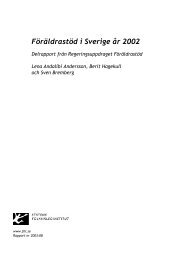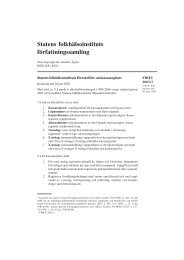Gambling motivation and involvement: A review of social
Gambling motivation and involvement: A review of social
Gambling motivation and involvement: A review of social
Create successful ePaper yourself
Turn your PDF publications into a flip-book with our unique Google optimized e-Paper software.
<strong>Gambling</strong> <strong>and</strong> the macro-economy<br />
There are apparently no specific theories on how gambling in society is influenced<br />
by macro-economic factors <strong>and</strong> trends, <strong>and</strong> there is little research on the subject. In<br />
the public debate, it is sometimes claimed that recession <strong>and</strong> high unemployment<br />
rates stimulate gambling. This claim rests on an assumption that in such bad times,<br />
people tend to put their faith in gambling <strong>and</strong> hitting the jackpot. It could, however,<br />
be argued that when people have less money to spend, they cut back on expenses<br />
for entertainment, such as gambling. According to this view, people would gamble<br />
more in times <strong>of</strong> prosperity, when they have more money to spend on entertainment.<br />
The “recession” theory has some academic adherents [209, 210], but there does not<br />
seem to be any solid evidence to support it. The “prosperity” theory, on the other<br />
h<strong>and</strong>, appears to be supported by a few studies [211, 212]. However, other scholars<br />
have come to the conclusion that the state <strong>of</strong> the market has little influence on the<br />
consumption <strong>of</strong> gambling [213]. On the stock market, the common view is that the<br />
revenues <strong>of</strong> gambling companies (except those running resort casino business) are<br />
relatively independent <strong>of</strong> business cycles <strong>and</strong> the macro-economy.<br />
Some other thoughts have been formulated on the extent <strong>of</strong> gambling <strong>and</strong> macroeconomic<br />
conditions. From a political science perspective, an interest group model<br />
<strong>of</strong> gambling regulation has been proposed [214]. The model is an application <strong>of</strong><br />
Gary Becker’s theory <strong>of</strong> competition among pressure groups for political influence<br />
[215]. Economic <strong>and</strong> political variables relating to gambling, such as the state’s<br />
income from gambling taxes <strong>and</strong> the cost <strong>of</strong> regulating gambling, are included in<br />
a model that assumes two opposing political st<strong>and</strong>points: one dem<strong>and</strong>ing strict<br />
regulation <strong>and</strong> the other favoring a liberal gambling market. The values <strong>of</strong> the variables<br />
predict the political support that the opposing st<strong>and</strong>points are likely to get.<br />
For instance, if the cost <strong>of</strong> gambling regulation is very high, support for regulation is<br />
likely to be weak, <strong>and</strong> if, through strict regulation, the state can make a lot <strong>of</strong> money<br />
from gambling taxes, support is likely to be strong. When applied to the modern<br />
history <strong>of</strong> gambling regulation in the USA, the model fits well [214].<br />
RELEvancE tO pRObLEm GambLinG StudiES<br />
There is little research on macro-economic impact on the extent to which a population<br />
is involved in gambling. This is unfortunate. Politicians, regulators <strong>and</strong> legislators<br />
wish to know the facts about the determinants <strong>of</strong> gambling participation <strong>and</strong><br />
how these relate to problem gambling prevalence. It is unclear how gambling participation,<br />
under various macro-economic conditions <strong>and</strong> models <strong>of</strong> gaming regulation,<br />
might best be studied – whether economics, history, political science, or some<br />
other discipline would be the most successful.<br />
40 G A M B L I N G M O T I VAT I O N A N D I N V O LV E M E N T

















